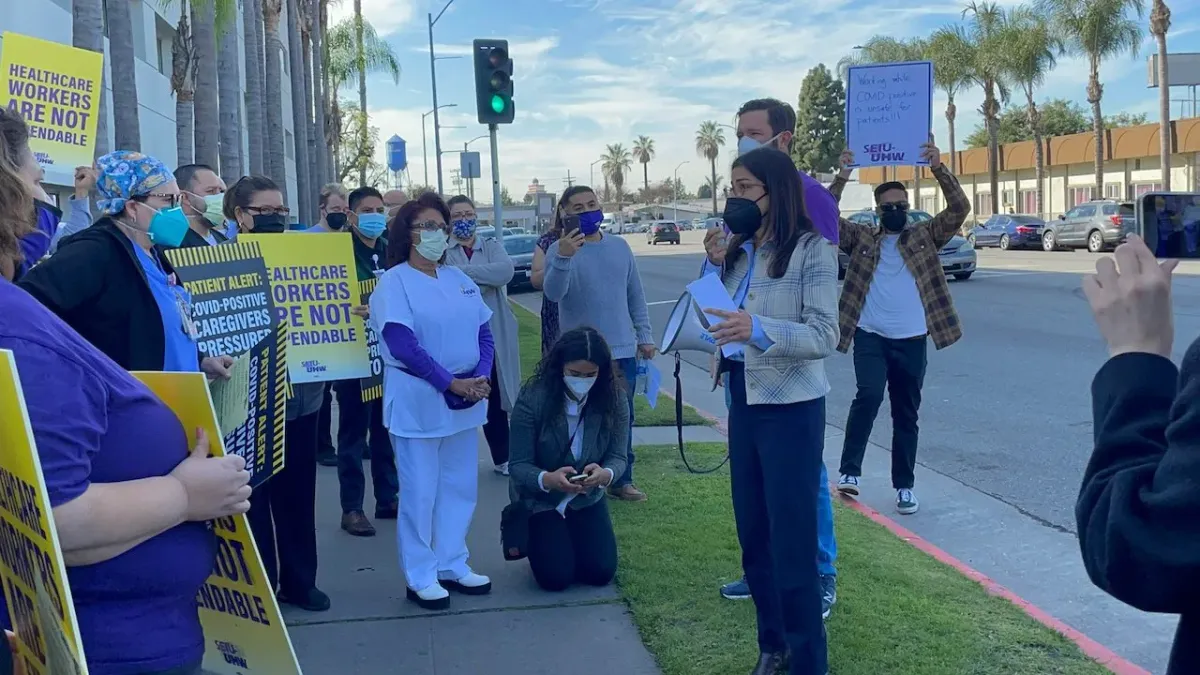
Staff were protesting Wednesday in response to the hospital’s COVID-19 policy.
On Wednesday, Representative Nanette Barragán announced that St. Francis Medical Center in Lynwood would immediately cease asking employees who are positive with coronavirus to work. Nurses, services workers, and other staff had held a protest against the practice that morning.
“This wouldn’t have happened if you didn’t organize a review to come out and have our voices heard,” Barragán said to a group of workers gathered outside of the hospital.

On January 8, the California Department of Public Health (CDPH) issued guidance temporarily allowing acute care hospitals, psychiatric hospitals, and skilled nursing facilities to bring healthcare workers back to work after they have tested positive for COVID-19 or been directly exposed without any testing or isolation periods. St. Francis adopted the guidance that day. Prime Healthcare did not respond to request for comment by time of publishing.
Mayra Castaneda, an ultrasound technologist at the hospital, was asked to work with coronavirus the day the guidelines were adopted. “Originally I was given 10 days. They said, go ahead, quarantine for 10 days. Immediately after this guideline was implemented, I got a call from [the] employee health [department] that said, ‘Oh, the guidelines changed. You can return by the fifth day,’” Castaneda tells Knock LA. “Think of using toilet paper and plugging your nose with an N95 and a surgical mask on top so that you won’t drip inside your mask. I couldn’t believe that, for two years, I’ve been out here on the front lines, taking care of these COVID patients, taking care of everyone that comes to the hospital. And now that I need the time, I’m not given that opportunity. It’s a slap in the face.”

Castaneda also says many workers faced financial pressure to work while sick. The California state legislature and Governor Gavin Newsom reached a deal this week to give workers up to two weeks of paid sick leave to recover or care for a family member with COVID, to be paid by companies. Castaneda is cautiously optimistic. “There has to be stipulations as to at what point can an employer deny the pay? What criteria will there be set in order for you to qualify? Will mild symptoms be covered, and what is considered a mild symptom? I’m definitely worried about the fact that the employer is the one paying out of pocket instead of the state because we already know what employers are known to do.”
Dolores Aguilar, who works in telemetry, estimates between six and seven employees in the unit are out this week. “Every single department from housekeeping, radiology, ER, or center supply. I mean, you name it, every department is suffering.” Castaneda also says St. Francis was flouting aspects of the new guidance. “The guidelines said try to keep your COVID-positive healthcare workers treating COVID-positive patients. That’s absolutely false. That’s not being done. And number two, it’s impossible to do.” Workers also worry about infecting people who weren’t positive to begin with.

While workers rallied outside of the hospital’s entrance, Barragán, Castaneda, and representatives from employee unions met inside. “They cited CDC policy, and I expressed to them my disagreement with the CDC policy and said, ‘Look, this isn’t just about this hospital for me,’” says Barragán. “I’m going to go to the administration, I’m going to go to the health officials and tell them that I disagree with this.”
Barragán tells Knock LA that the verbal agreement would be enforced by her office. “I’m going to hold them accountable to that commitment, and they know very well that if they break that commitment, we will be right back here.”
For years, St. Francis Medical Center was operated by Verity Healthcare as a nonprofit. When the operator filed for bankruptcy in 2018, it pledged that its six California hospitals would stay open. The US Bankruptcy court approved Verity’s request to reject collective bargaining agreements with the hospital’s two unions, SEIU and UNAC, in April of 2020, stating, “St. Francis would not continue to operate as a going concern, and all of the UNAC (and SEIU) represented employees would lose their jobs.” St. Francis was sold to Prime Healthcare for a net $350 million a few months later. Shortly afterward, large numbers of hospital staff were laid off; employees estimate as many as 30%. A hospital spokesperson told reporters that not only have staffing levels not been negatively impacted by the layoffs, but that the quality of care would get better.
Prime Healthcare has a documented history stretching back over a decade of prioritizing profits over patient care. On four occasions since 2002, inspectors have found that Prime Healthcare facilities failed to meet minimum federal safety standards, placing their Medicare funding at risk. In 2007, the Los Angeles Times reported that “When Reddy’s company, Prime Healthcare Services Inc., takes over a hospital, it typically cancels insurance contracts, allowing the hospital to collect steeply higher reimbursements. It has suspended services — such as chemotherapy treatments, mental healthcare, and birthing centers — that patients need but aren’t lucrative.” The state of California sued Prime Healthcare in 2008over its balance billing practices — where a healthcare provider bills a patient for the difference between the total cost of services being charged and what insurance pays. The US Department of Health and Human Services and the California Department of Justice investigated Prime Healthcare in 2010 over concerns over a reported spike in sepsis. Kaiser Permanente also sued that year over a practice of trapping patients in Prime facilities. In 2011, elderly patients in Prime’s care were found to have high rates of kwashiorkor, or protein malnutrition. The US Department of Justice investigated the operator in 2016 and again in 2021 for Medicare fraud, kickbacks, overcharging for medical implants, and billing using another hospital’s identity.
Martha Alvarez, a certified nursing assistant who has worked at Inglewood’s Centinela Hospital Medical Center for 51 years, says that she was asked to open the first COVID floor in March 2020. “I asked one of the directors in there, ‘I thought people over 65 years old were not allowed to be in contact [with positive patients]. They told me that no, working here, you have to work. So, what kind of people are these?” Alvarez tested positive over the holidays that year, and recovered.
Last year, Prime reported $4.72 billion in revenue.

Workers report ongoing issues that have not been addressed by this week’s agreement. Castaneda says that St. Francis has continued to deny workers COVID tests. “You have to sign a slip and get permission from a supervisor. Once you get that form, you have to go get in line and wait to see if [the] employee health [department] is open. It’s just ridiculous.” Furthermore, employees aren’t notified once they’ve been exposed. Castaneda found out that others in her unit were out with COVID after she called them herself. Two days later, she tested positive. Then, the fourth ultrasound tech tested positive. And then, the fifth. “Clearly, the protocols that they have in place aren’t working,” she says. “It’s not safe.”
Short staffing was a problem before the pandemic. “The trend in healthcare has been to always pare down the war, the labor in the hospital, and then put it on the nurses,” says Ana Bergeron, an RN at St. Francis. A study by Registered Nurses Forecasting estimates that an increase in hospital nurses’ workloads by one patient increases the likelihood of in-hospital death by 7%. “We’ve reached a critical point now that accentuates all the problems that were there before.” Scott Byington, a mobile critical care nurse, agrees. “We need support staff. You need people who can come in and answer the phones. Otherwise it’s a choice to take care of the patient or answer the phone.” It is unclear how Prime Healthcare will handle staffing shortages with the new agreement in place. Prime Healthcare did not respond to request for comment by time of publishing.
Bergeron also reports that the hospital sometimes only has one housekeeper for the entire campus. “How are we supposed to turn around beds for patients? How is she going to maintain the sterility?” Castaneda says many healthcare workers are burned out. “I hear it every day. I’m done with healthcare. I’m done. I can’t take this anymore. They’re not respecting us.”
Byington and Bergeron also say the hospital will often bring in nurses to work units they have no experience in. “They themselves are being put in a difficult situation because they’re being asked to do things that they don’t know how to do,” she says. “So what happens is then they leave, too, because they don’t feel like they’re being put in a position where they can protect their license.”
Lack of oversight also has left many hospital workers frustrated. Castaneda estimates that three of St. Francis’s eight floors are for COVID patients, and says that the LA County Department of Health will not examine them. LACDPH did not respond to requests for comment by time of publishing.
Workers at South LA’s two Prime Healthcare facilities ask the community to listen to their message. “When the workers unite, when working people unite, things change. Can you imagine if everybody just started doing that? If every single person that wasn’t getting paid a living wage just started saying, that’s enough?”
